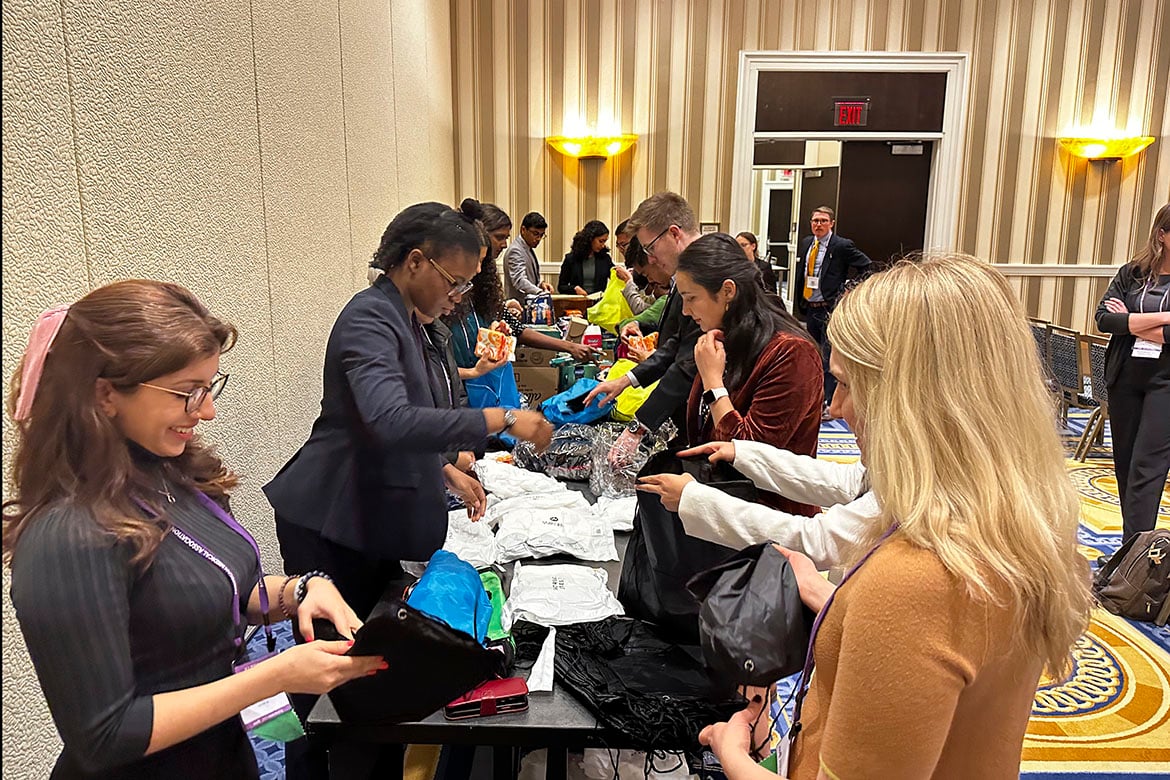Gaining knowledge means little without practical application. At the most recent AMA Interim Meeting, medical students demonstrated what practical applications look like.
Following an education session sponsored by the AMA Medical Student Section (AMA-MSS) that examined the practice of street medicine—providing care to patients without homes in the places where they convene—students assembled 100 care kits. Funded by a grant from the AMA Foundation, the kits contained essential items for people without homes such as over-the-counter medications, hygiene products and hand warmers.
Both the education session and the creation of the care kits were spearheaded by AMA-MSS members Shad Yasin and Anand Singh. They are both involved with street medicine in their communities.
“There is the educational component, which is so valuable to all of us as students, but our goal was that we wanted to make our programming a lot more interactive and a lot more engaging while we're still including that educational component,” said Singh, a third-year medical student at Anne Burnett Marion School of Medicine at Texas Christian University (TCU) who is chair-elect of the AMA-MSS governing council.
Arming students with knowledge
A fourth-year medical student at Rutgers University New Jersey Medical School, Yasin, an AMA member, has worked with patients experiencing homelessness at shelters in Newark, throughout his time in medical school. He now directs medical student-run clinics at four shelters.
Seeing the power of street medicine firsthand, Yasin was moved to work with Singh and other members of the AMA-MSS’ Committee on Legislation and Advocacy and the Community Service Committee to help medical students understand the practice and how they can take part in it or even establish a street-medicine program.
“With the rise in street-medicine programs, and with both myself and Anand understanding the role [students] play in them, we thought it was important to talk about what they are and how these programs can get started,” Yasin said. “At a lot of medical schools around the country, these programs are student-led initiatives working alongside other local organizations.”
Among the session panelists was family physician Tobie-Lynn Smith, MD, MPH. She is the founder and executive director of Street Health DC, the organization to which the kits were donated.
“The first portion of the session, we had some really knowledgeable panelists educating people on what street medicine is and the needs of these patients, then we were able to have this assembly line where we created kits and for those street outreach runs,” Yasin said.
Advocating for street medicine
Working with the safety net hospital in Fort Worth, Texas, Singh helped to establish a Street Medicine Group at TCU. He also has been a leader in creating AMA policy related to the field.
Singh was one of the lead authors on policy adopted at the 2023 AMA Annual Meeting to support the implementation of Medicare and Medicaid payment for street-medicine initiatives. After the AMA policy was created, the Centers for Centers for Medicaid & Medicaid Services officially recognizing that medical care can be delivered on the street, making it possible for physicians and other health professionals to be paid for services provided to patients without homes.
Following that development, the AMA wrote a letter of appreciation about the new Place of Service Codes to support street medicine practices and urged U.S. Department of Health and Human Services to provide physician education to ensure it is widely used.
“It was the perfect time to build on that momentum,” Singh said. “The interest in street medicine has skyrocketed. At the end of the day, as medical students, no matter the specialty we go into, we want to help people.”
Yasin said the program had an effect on many in attendance.
“I have gotten personal calls from students from other schools who are interested in trying to get these programs started,” he said. “We are hoping this will be a good steppingstone.”






